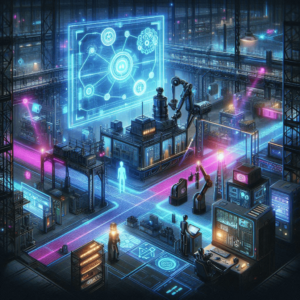Integrated intelligence in smart manufacturing represents a paradigm shift in how manufacturing processes are designed, executed, and optimized. This shift is driven by the convergence of advanced technologies such as artificial intelligence (AI) in manufacturing, the Internet of Things (IoT), cloud computing, and edge computing. These technologies work together to create a more responsive, efficient, and flexible manufacturing environment that can adapt to the rapidly changing demands of the market.
1. The Framework of Integrated Intelligence
At the core of integrated intelligence in smart manufacturing is the concept of a cyber-physical system (CPS). A CPS integrates physical processes with computational resources, enabling real-time monitoring and control of manufacturing operations. This integration allows for enhanced data collection and analysis, leading to better decision-making and operational efficiency.
The framework of integrated intelligence can be broken down into several key components:
Smart Devices
These include sensors, actuators, and machines equipped with AI in manufacturing. They collect data from the manufacturing environment and perform tasks autonomously or semi-autonomously.
Data Communication Networks
High-speed communication networks, including 5G and industrial IoT protocols, facilitate the seamless exchange of data between devices and central processing units.
Cloud and Edge Computing
Cloud computing provides the necessary computational power for data analysis and storage, while edge computing allows for real-time data processing closer to the source, reducing latency and bandwidth usage.
AI Algorithms
Machine learning (ML) and deep learning (DL) algorithms analyze the data collected from smart devices to identify patterns, predict outcomes, and optimize processes.
2. Key Technologies Driving Integrated Intelligence
The implementation of integrated intelligence in smart manufacturing relies heavily on several key technologies:
Artificial Intelligence
AI plays a crucial role in automating decision-making processes. It enables predictive maintenance, quality control, and resource optimization. For instance, AI algorithms can analyze data from sensors to predict equipment failures before they occur, allowing for timely maintenance and reducing downtime.
Internet of Things (IoT)
IoT devices collect vast amounts of data from the manufacturing floor. This data can be used to monitor equipment performance, track inventory levels, and optimize production schedules. The integration of IoT with AI enhances the ability to make data-driven decisions.
Cloud Computing
Cloud platforms provide scalable resources for data storage and processing. They enable manufacturers to analyze large datasets and derive insights that can improve operational efficiency. Cloud computing also facilitates collaboration across different manufacturing sites.
Edge Computing
By processing data closer to where it is generated, edge computing reduces latency and bandwidth requirements. This is particularly important for time-sensitive applications, such as real-time monitoring and control of manufacturing processes.
3. Benefits of Integrated Intelligence in Smart Manufacturing
The integration of AI in manufacturing offers numerous benefits:
Increased Efficiency
Automated processes reduce the need for human intervention, allowing for faster production cycles and improved throughput. AI-driven scheduling and resource allocation optimize the use of machinery and labor.
Improved Quality
AI algorithms can detect anomalies in production processes, enabling immediate corrective actions. This leads to higher product quality and reduced waste.
Cost Reduction
By optimizing resource utilization and minimizing downtime, AI in manufacturing can significantly lower operational costs. Predictive maintenance reduces the costs associated with unexpected equipment failures.
4. Challenges in Implementing Integrated Intelligence
Despite the many advantages, there are challenges associated with the implementation of integrated intelligence in smart manufacturing:
Data Security and Privacy
The increased connectivity of devices raises concerns about data security. Manufacturers must implement robust cybersecurity measures to protect sensitive information.
Integration of Legacy Systems
Many manufacturing facilities still rely on legacy equipment that may not be compatible with modern technologies. Retrofitting these systems can be costly and complex.
Skill Gaps
The transition to AI in manufacturing requires a workforce skilled in advanced technologies. Manufacturers must invest in training and development to equip their employees with the necessary skills.
High Initial Investment
The adoption of integrated intelligence in smart manufacturing often requires significant upfront investment in infrastructure and training. Manufacturers must carefully evaluate the return on investment.
5. Future Trends in Integrated Intelligence
Looking ahead, several trends are likely to shape the future of integrated intelligence in smart manufacturing:
Increased Adoption of AI and ML
As AI technologies continue to evolve, their adoption in manufacturing will become more widespread. This will lead to more sophisticated predictive analytics and autonomous decision-making capabilities.
Greater Emphasis on Sustainability
Manufacturers will increasingly focus on sustainable practices, utilizing AI in manufacturing to optimize resource consumption and reduce waste.
Expansion of Digital Twins
Digital twin technology, which creates virtual replicas of physical systems, will become more prevalent. This will enable manufacturers to simulate and optimize processes before implementation.
Enhanced Collaboration
The integration of supply chain partners through digital platforms will facilitate better collaboration and information sharing, leading to more efficient operations.
Conclusion
Integrated intelligence in smart manufacturing represents a significant advancement in how manufacturing processes are designed and executed. By leveraging AI in manufacturing, IoT, cloud computing, and edge computing, manufacturers can create a more responsive, efficient, and flexible production environment.
While challenges such as data security, legacy system integration, and skill gaps remain, the benefits of integrated intelligence in smart manufacturing far outweigh the obstacles. These technologies enable manufacturers to reduce costs, improve efficiency, enhance product quality, and increase adaptability, ultimately leading to a more competitive and resilient manufacturing sector.
In summary, the future of smart manufacturing lies in the seamless integration of AI-driven intelligence and automation. As industries continue to embrace integrated intelligence in smart manufacturing, they will pave the way for a more sustainable, agile, and innovative manufacturing ecosystem.
Do you like to read more educational content? Read our blogs at Cloudastra Technologies or contact us for business enquiry at Cloudastra Contact Us.
